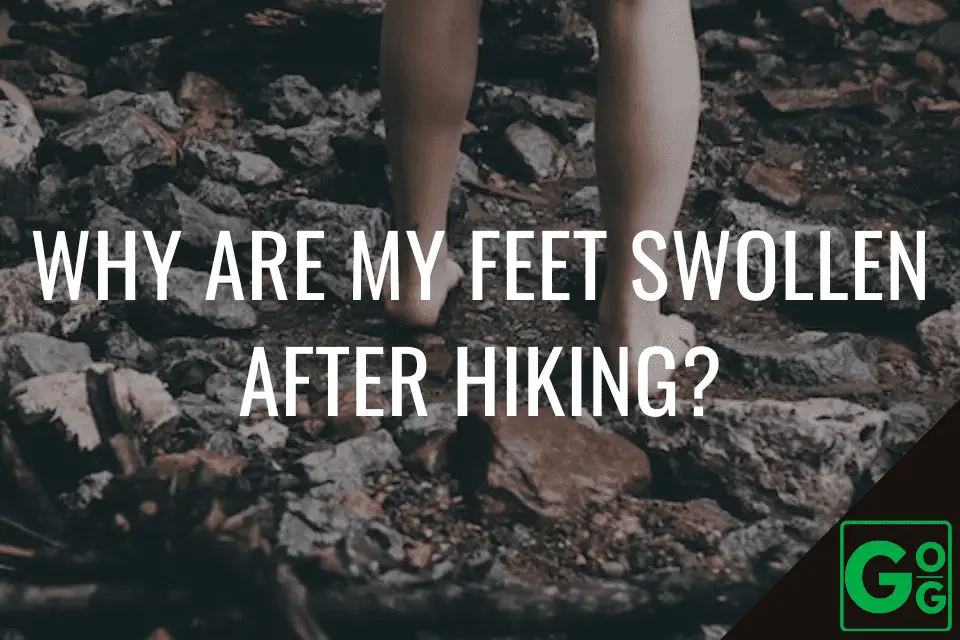We support our blogging by participating in affiliate programs. We may receive a small commission if you click through a link in this post and purchase something you need, however, this will have no impact on the price you pay for the item. Learn more about it on the Disclosure page.
Hiking is a great way to get some exercise and enjoy the outdoors, but sometimes it can leave you with sore muscles and swollen feet. There are a few reasons why this may happen, and luckily there are some things you can do to prevent it. So if you’re wondering “Why are my feet swollen after hiking?” read on to find out more.
Key Takeaways:
- Swelling occurs as your blood vessels dilate to bring more oxygen to your muscles
- Fluids can leak out of the muscles and lead to swelling in the tissue of your feet
- Dehydration and heat are common causes of increased swelling and you should consult your doctor if you are regularly suffering from swollen feet when hiking

Why Are My Feet Swollen After Hiking?
If you’re an avid hiker, you know how great it feels to explore the great outdoors. But sometimes, after a long day of hiking, your feet can be swollen and sore. Here’s why.
When you hike, your heart rate increases and your blood vessels dilate to bring more oxygen-rich blood to your muscles. This can cause fluid to leak out of your blood vessels and into the tissues of your feet, leading to swelling. Additionally, gravity pulls on the fluids in your body when you hike downhill, which can also lead to swelling in your feet and ankles.
Fortunately, there are some things you can do to prevent or reduce foot swelling after hiking. First, take breaks often so your muscles don’t get too tired. Second, wear supportive shoes that fit properly so that your feet don’t get too cramped up.
So swollen feet are not something that you need to worry about unless they are causing you pain, in which case you need to make sure you take a break and rest.
What Helps Swollen Feet After Walking?
If you’re dealing with swollen feet after a long day of walking, there are a few things you can do to help.
- Try to elevate your feet above your heart for 20-30 minutes. This will help reduce the swelling.
- You can also try putting a cold compress on your feet for 10-15 minutes to help reduce inflammation.
- Make sure you’re wearing comfortable shoes that provide support and aren’t too tight. If you can avoid these issues, you should be able to walk without dealing with swollen feet.
Why Do I Retain Water After Hiking?
When it comes to hiking, there are a few things that can go wrong. One of the things that can happen is that you may retain water after hiking. This can be caused by a number of different things. Here are a few reasons why you may retain water after hiking:
- You didn’t drink enough water before or during the hike – When you don’t drink enough water, your body will start to hold on to what it does have. This can cause you to retain water after the hike.
- You didn’t eat enough – If you didn’t eat enough before or during the hike, your body may start to break down muscle for energy. This can lead to water retention as well.
- You have a medical condition – If you have a medical condition such as diabetes or hypothyroidism, you may retain water after hiking. These conditions cause your body to break down muscle for energy. This can lead to water retention.
Can Dehydration Cause Swollen Feet?
Yes, dehydration can cause swollen feet. When the body is dehydrated, it doesn’t have enough fluid to circulate properly, which can lead to the pooling of fluid in the extremities. This can cause the feet and ankles to swell. Swelling from dehydration can also accompany other symptoms, such as headache, dizziness, and fatigue. If you are experiencing these symptoms, it’s essential to drink plenty of fluids and seek medical attention.
How Do I Get My Feet Ready for A Long Hike?
Whether you’re an experienced hiker or just starting out, it’s important to take care of your feet before embarking on a long hike. Here are a few tips to help you get your feet ready for the trail:
- Start by trimming your nails. This will help prevent any unwanted pain or irritation while you’re walking.
- Make sure to pack plenty of socks. Not only will this keep your feet dry, but it will also help prevent blisters.
- Choose the right shoes. This is arguably the most important step in preparing for a hike. Make sure to pick a pair that’s comfortable and has good support.
Are Compression Socks Good for Hiking?
Compression socks are a type of sock that is tight-fitting and helps to improve blood flow. They are often used by athletes or people who have to stand for long periods of time. Some people believe that compression socks can also help to prevent or reduce swelling in the feet and ankles.
So, are compression socks good for hiking? There is no definitive answer, but they may be worth considering if you hike often and tend to experience swelling in your feet or ankles. Compression socks can help to improve blood circulation and may reduce swelling. However, they can also be uncomfortable and may not be suitable for everyone. It’s important to try different types of socks and see what works best for you.
Will Hiking Tone My Legs?
If you’re looking to tone your legs, there’s no better exercise than hiking. Not only does it burn calories and build muscle, but it also gets you outdoors in nature.
Hiking is a great workout for your legs because it works all the major muscles, including your quads, hamstrings, and calves. Plus, when you hike uphill, you’re also working your glutes.
To get the most benefit from hiking, make sure to focus on proper form. Keep your shoulders back and your abs engaged, and swing your arms as you walk. This will help you walk faster and burn more calories.
Hiking is a great way to tone your legs and improve your overall fitness. So get out there and hit the trails!
Summary
So there you go, if your feet are swollen after hiking it is most likely due to heat and dehydration. Drink plenty of fluids and rest your feet up as much as possible. If the swelling does not go down after a day or two, it is best to consult a doctor. They will be able to determine if there is a more serious underlying condition causing the swelling.
